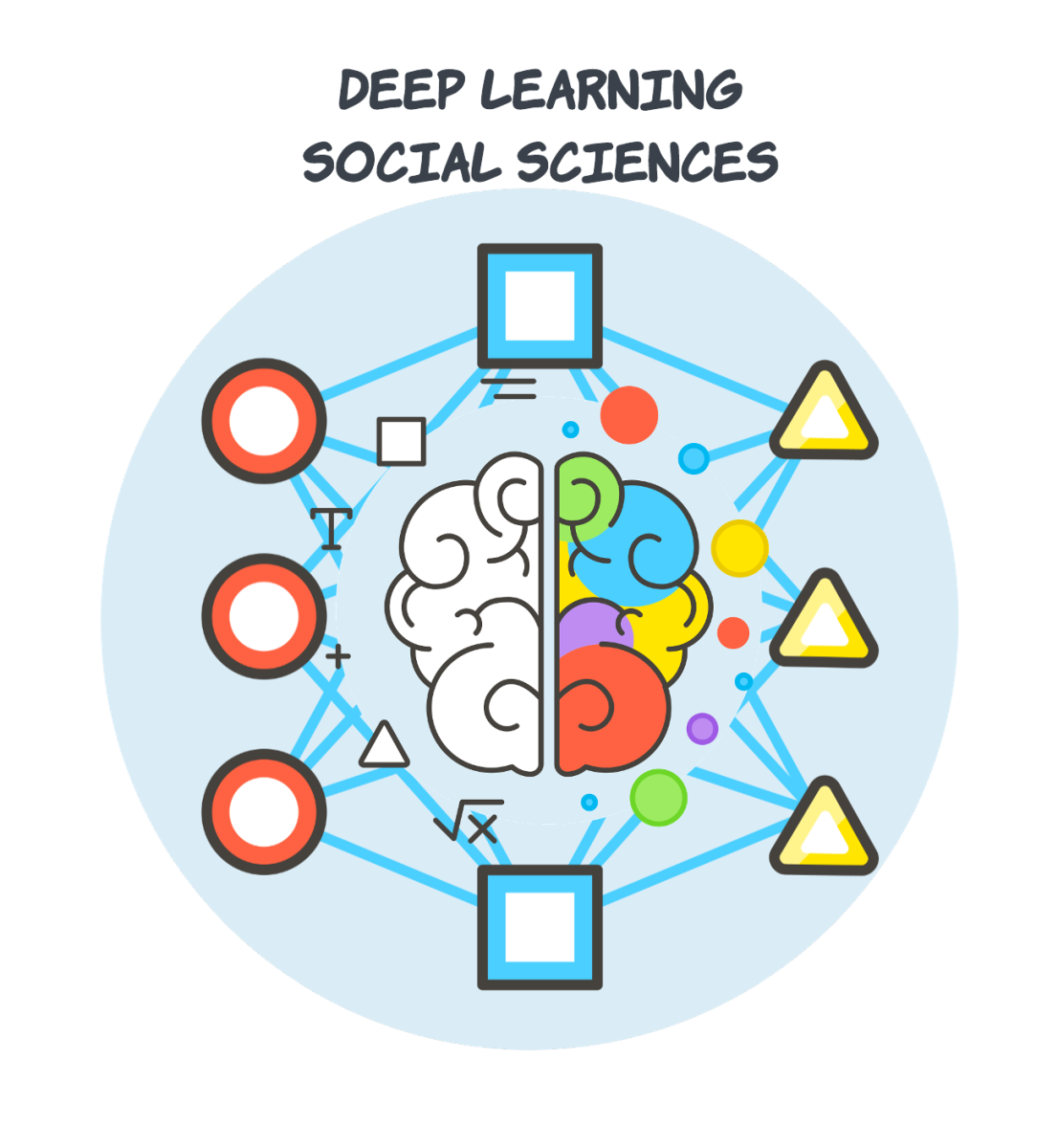Struggling with messy, unstructured data? Wondering how to make AI work for your research without spending months on theory? This course will show you how to fine-tune models, improve results for your specific dataset, and choose the right evaluation methods—all in a way that’s accessible and practical for social scientists and researchers.
Data in social sciences is more than just numbers—it’s images, speech, and a mix of different formats that don’t always fit neatly into traditional analysis methods. That’s where deep learning comes in. This masterclass is a practical introduction to using transformers for real-world research problems with focus on non-text (multimodal) applications. No advanced coding or math skills required.
Whether you're looking to add AI to your research toolkit or just curious about what deep learning can do, this masterclass will give you the foundation you need to start experimenting with confidence.
This course is being held online over 3 days via Zoom and run on Australian Eastern Standard Time (UTC +10)
(Canberra, Sydney, Melbourne, Brisbane time)

Data in social sciences is more than just numbers—it’s images, speech, and a mix of different formats that don’t always fit neatly into traditional analysis methods. That’s where deep learning comes in. This masterclass is a practical introduction to using transformers for real-world research problems with focus on non-text (multimodal) applications. No advanced coding or math skills required.
Over three days, you’ll get hands-on with Python and Google Colab, learning how to apply pretrained transformer models to tasks like emotion detection in images, speech-to-text conversion, and integrating multiple data types. You’ll work with real-world datasets and powerful pre-trained models, so you can see firsthand how AI can uncover patterns and insights that traditional methods might miss.
Struggling with messy, unstructured data? Wondering how to make AI work for your research without spending months on theory? This course will show you how to fine-tune models, improve results for your specific dataset, and choose the right evaluation methods—all in a way that’s accessible and practical for social scientists and researchers.
Whether you're looking to add AI to your research toolkit or just curious about what deep learning can do, this masterclass will give you the foundation you need to start experimenting with confidence.
This course will be run over 3 days using the following timetable:
Day 1
- 9.30 am - 10.00 am – Introductions and setup check
- 10.00 am - 11.30 am - Session 1
- 12.30 pm - 2.00 pm - Session 2
- 3.00 pm - 5.00pm - Session 3 + exercises
Days 2 and 3
- 9.00 am - 10.30 am - Session 1
- 11.30 pm - 1.00 pm - Session 2
- 2.00 pm - 4.00pm - Session 3 exercises and consultation
Dr. Maria Prokofieva is an Associate Professor in AI/ML at Victoria University and a data lead at the Mitchell Institute, Vic. She works on projects that use AI/ML approaches and Large Language Models to research applications in business and healthcare. As a machine learning engineer with a deep passion for the responsible application of AI, Maria's work deciphers complex online behaviors to inform consumer and business strategies. She also chairs the CPA Australia Business Analytics Group and part of CPA Australia Technology Innovation Committee, driving innovation in data analysis tools. Maria’s contributions to both research and practical applications are shaping the integration of AI in business and policy on a global scale.
Data in social sciences comes in various forms: numbers, text, images, and audio. This masterclass will introduce you to deep learning (DL) techniques to work with these data types using transformers. You will gain hands-on experience with key DL concepts, including transformers, and learn how they can be applied to social science research.
This course is based on Python and uses Google Colab, making deep learning accessible even for those with no prior programming experience. One session will be dedicated to learning essential Python tools, including NumPy for numerical operations, Pandas for data manipulation, and Matplotlib for data visualization.
Designed for social scientists, PhD students, researchers, marketing specialists, and business strategists, this course provides practical exposure to machine learning techniques relevant to large datasets and complex social behaviors. Whether you're interested in analyzing emotions in speech, detecting patterns in images, or integrating multimodal data, this masterclass offers a hands-on, intuitive introduction to AI-powered research.
No prior expertise in programming is required, making it an ideal entry point for those looking to leverage deep learning in their work. Join us to explore cutting-edge AI tools and bring data-driven decision-making into your research and professional practice.
Day 1: Foundations of Deep Learning (DL)
- Introduction to Python
- DL and neural networks basics
- Main DL architechtures: transformers
- Hugging Face hub and proprietary models
- Evaluation of results and ways to improve
- Cases
- examples of using transformer models (Hugging Face) to understand the DL workflow and tasks that can be accomplished (text and non-text based).
Day 2: Visual and Multimodal Applications
- Visual applications of DL
- Introduction to Vision Transformers (ViTs)
- Image classification and Emotion Detection
- Object Detection and Visual Question Answering (VQA)
- Image Captioning and Video Classification
- Evaluation of results and ways to improve
- Cases
- Using the AffectNet dataset to classify emotions in facial images
- Using the COCO dataset for detecting objects in social settings.
- Using the VQA v2 datset for developing models that answer questions based on images.
- Using Flickr8k dataset for generating descriptive captions for images.
- Using the Kinetics-400 dataset for action recognition in videos.
Day 3: Audio and Multimodal Applications
- Overview of Deep Learning Applications in Social Sciences
- Audio Classification and Emotion Detection
- Audio-to-Text Conversion
- Multimodal Applications and Integration
- Evaluation of results and ways to improve.
- Planning your DL project
- Cases
- Using RAVDESS datset for speech-based emotion recognition
- Using the LibriSpeech dataset for automatic speech recognition (ASR).
- Multimodal Applications (Image-Text-Audio Fusion) - Using MELD (Multimodal EmotionLines Dataset) for emotion recognition in conversations (text+audio+visual).
- Multimodal Integration for Social Science Research - Using How2 Dataset (Video, text, audio) for real-world multimodal learning.
This workshop will take place online.
BYO Laptop + Zoom. Both PC and MAC are great
The course uses Google Colab and requires a Google account (please make sure you have one or please register one before the session)
All course materials will be provided
The course requires understanding of a basic of statistical concepts, exposure to machine learning foundations is beneficial as well, such as Machine Learning for Data Science: Surpervised Learning Techniques
The course assumes no prior knowledge of Python, though some programming experience (e.g. using R) is beneficial.
TensorFlow official Getting Started Guide
https://www.tensorflow.org/tutorials/quickstart/beginner
Géron, A. (2022). Hands-on machine learning with Scikit-Learn, Keras, and TensorFlow. O'Reilly Media, Inc.
https://learning.oreilly.com/library/view/hands-on-machine-learning/9781492032632/
Q. Do I need to install anything before the session? What is Google Colab?
A. No, you do not need to install anything. We will work with Google Colab which is a free cloud service hosted by Google. It allows you to write and execute Python code through your browser. Just make sure you have a Google account! You can sign up here:
https://accounts.google.com/signin
Q. I have used R before, but not Python. Will I struggle?
A. Coming from an R background, you'll find that Python has some differences in syntax and data structures, but many of the underlying concepts are similar – you will be fine!
Q. Where can I see resources for the course?
A. All resources will be available after the course in open access, including Jupyter notebooks with practical examples covered throughout the course and additional cases.
I wanted to get behind the scenes of what was happening with artificial neural networks to see how these algorithms worked. Maria provided a very in-depth presentation of the structure of these processes that suited my experience.
I very much hope Maria's course/s on deep learning continue as the material is extremely insightful.
1. BOOKING - ACSPRI does not accept ‘expressions of interest’ for course places, i.e. all bookings, are considered firm, and a cancellation fee is charged if you cancel your booking after the early-bird date.
2. DISCOUNT RATE – The discounted rate for ACSPRI members is available to all staff and students of member organisations. To be eligible for this rate:
The course fee must be paid by either the member organisation or by you. Where fees are paid by a non-member organisation the non-member rate applies:and
You must either have a valid email address issued by the member organisation; or you must hold, or have a right to hold, a current staff or student identity card from the member organisation.
In addition, to be eligible for a full time student discount the participant must:
Hold, or have a right to hold, a current student identity card from the member organisation;
Be enrolled as a full-time student;
Make payment in full with your application, arrange electronic funds transfer (EFT), or contact ACSPRI to advise credit card details for payment, by the early-bird closing date;
Provide ACSPRI with contact details of your supervisor, so we can request them to confirm your eligibility for the full time student rate.
The early bird rate applies to all bookings paid in full by the early bird close date, otherwise you will be charged at the standard rate.
3. REFUNDS & CANCELLATIONS - Course fees are not refundable unless:
we cancel the course in which you have enrolled; or
you cancel your enrolment before the early-bird closing date.
A cancellation fee of $250 will be charged if you cancel within the period from the early-bird closing date of and one week prior to the commencement of the program. The full course fee will be charged if you cancel within 1 week of the beginning of your course.
4. PRE-REQUISITES - Course descriptions specify course pre-requisites. You must undertake to meet the pre-requisites of the course(s) in which you enrol. If in any doubt, you should contact ACSPRI prior to enrolling.
Delivery of this course is online - via Zoom.
Please ensure you have the following:
- Reliable Internet connection with at least 5Gb per day of data available (i.e. a 5 day course will use about 25Gb of data just on the Zoom application)
- A computer/laptop with the Zoom application installed (free)
- A webcam (built in to most laptops)
- A headset with a microphone (not required but ideal)
- A second monitor/screen if possible
Please also check the course page for specific software requirements (if any).
